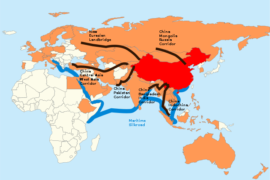As Election Day approaches in the United States against the backdrop of a broadening war in West Asia, debates continue to rage over the question of how the outcome of a race between Vice President Kamala Harris and former President Donald Trump might impact the future of the region.
The conventional wisdom amongst most Israelis and pro-Israel Diaspora Jews has been that another Trump presidency would be far more beneficial to Israel than a Harris administration and that Jews should therefore throw their support behind the former president.
There are of course Liberal Zionists, as well as Jews who see themselves as both “liberal” and “Zionist” (without falling into the official Liberal Zionist camp), who’ve put forward arguments for why their perception of Israel’s interests could best be met by a Kamala Harris presidency. But the overwhelming majority of Israelis and Israel supporters abroad have for the most part accepted the premise that Trump is the candidate most likely to strengthen the US-Israel relationship and support Israel in our current war against Iran and its regional proxies.
This makes sense given the fact that Trump and his rightist political base tend to hold more surface-level positive views of Israel while Harris appears closer to a constituency more supportive of Palestinians. But a closer examination makes clear that this breakdown centers around ideology, values, and a misunderstanding of Israel.
The pro-Israel voices in Trump’s camp largely support Israel because they see it as an extension of American power. In their perception of a conflict between Western civilization and a “savage” Islamic world, they see Israel as a bulwark of the West nestled in the heart of a decisive region for protecting US imperial interests.
While many of Harris’s liberal supporters might hold a milder version of this view, there’s also a significant camp within her base that is vocally critical of US imperialism, America’s colonial past, and how they see that ugly past mirrored in Israel’s contemporary treatment of Palestinians. For many of these people, curtailing Israel’s wrongs can have a redemptive affect on America’s past, demonstrating that the US has evolved to the point of opposing the kinds of injustice it was founded upon.
But if we look at Israeli society as it actually exists, identify Israel’s deeper aspirations/national interests, and analyze the current challenges confronting the Jewish people, our understanding of next week’s US election changes.
For starters, Israeli and US interests don’t always align. In fact, every US administration since 1967 (including Trump) has consistently shown that Washington opposes an Israeli presence in the territories won during the Six-Day War. But these territories, specifically the West Bank, constitute the cradle of Jewish civilization – the very places that our people have been struggling to return to for nearly 2,000 years.
The West Bank also constitutes the central mountain region overlooking Israel’s densest population centers, national parliament, and airport. One of the most significant conclusions reached during this war is that Israeli leaders had been mistaken to surrender territory at Washington’s behest. So while US policy makers continue to the see a “two-state solution” as a central objective for US policy in our region, Israelis are more reluctant than ever to accept the further partition of our land. This will likely raise tensions between Washington and Jerusalem in the coming years, regardless of who wins this presidential election.
Supporters of both candidates are also wrong about Israel being an extension of American power and part of Western civilization. It may be true that “first Israel” (Israel’s westernized ruling class) has long tried to present the Jewish state this way. But this sector of the population has been rapidly shrinking in recent years in favor of a “second Israel” (Ḥaredi, Mizraḥi, national-religious Jews, etc. that all experienced marginalization at the hands of “first Israel”) that sees itself as having far less in common with the West.
What’s more, Washington’s overt support for “first Israel” in its domestic cultural conflict with “second Israel” has given the latter group a healthy distrust of Uncle Sam.
Like Kamala Harris, Donald Trump is happy to provide support for a Western Israeli state that is dependent on American power and embraces a two-state paradigm. But that’s not what Israel came home from exile to be. In fact, Israel returning to our true identity, worldview, and values system would likely pit us against US imperialism and its impact on humanity.
So if both Trump and Harris are likely to treat Israel as a vassal and to push for Jerusalem to surrender territory, the question we should ask is which candidate would be easier for Israeli leaders to resist. The answer is obviously Harris. Just as Prime Minister Binyamin Netanyahu (Likud) found the courage to defy President Joe Biden’s administration at several points during this war, he would likely also be able to muster the courage to say no to Kamala. But an unstable narcissist like Trump, who already thinks Israel owes him for several gestures during his previous term, might be harder to refuse. Especially given his nature.
This is not only true for Prime Minister Netanyahu – who Trump has already blamed for the failure of his two-state “Deal of the Century” – but also for Israel’s national camp and rightwing Diaspora Jews. Pressure from Trump to surrender territory would be more difficult to resist than the same pressure from Harris.
In terms of Israel’s current war against Iran and its proxies, Trump has already made clear that he wants it to end before he takes office in January (while his running mate JD Vance has stated strong opposition to being dragged into a war with Iran). It’s important to Trump that he appear powerful and influential in comparison to Biden and, given Biden’s perceived impotence in controlling Netanyahu, Trump reigning in Israel might go a long way in demonstrating his strength.
Another important question to consider is Israel’s internal national development. In order to advance towards becoming the nation we came hone to be, Israelis must increase a healthy desire for freedom from the US empire. This desire has grown and spread over the course of the last year but a Trump presidency that deploys shallow pro-Israel soundbites could potentially lull many Israelis back into the false hope of a strong US-Israel partnership.
On the surface, Donald Trump would be the friendly president who loves Israel while Kamala Harris would be the hostile president who hates Israel and sides with our enemies. It would therefore be easier for Israelis and pro-Israel Diaspora Jews to mobilize in opposition to Harris than it would be to do so in opposition to Trump. Because most Israelis don’t yet understand that it’s the US empire itself that seeks to limit Israel’s growth, many can be seduced into a false sense of security by pro-Israel platitudes from friendly US political figures. We witnessed this during Trump’s previous term, when even those who normally lead resistance efforts against US pressure to cede land were effectively neutralized.
Kamala Harris’s open hostility, on the other hand, would likely increase Israel’s desire for independence and help advance Israeli society in a healthier direction.
So in addition to the fact that both candidates are likely to try forcing Israel to surrender land (or at the very least prevent Israel from rebuilding Jewish communities in Gaza) and Harris will be easier to resist, another strong argument for preferring a Harris victory would be her beneficial impact on Israel’s national development.
This is by no means a call for US Jews to vote for Harris or support her candidacy. In addition to the fact that she’s merely a puppet of her party’s donor class, Jews should see ourselves as belonging to the Israeli nation and therefore shouldn’t participate in the elections of other nations. But it’s important for us to recognize that the Jewish liberation cause might be better served by a Harris presidency than a Trump presidency.
The reality we seek to attain is one in which the results of a US election have little impact on Israel. So rather than debate which presidential candidate would be more likely to support Israel or less likely to force destructive policies on us, we should focus the conversation more on the steps Israel should take to achieve real independence and no longer feel our country so vulnerable to the results of American elections.





